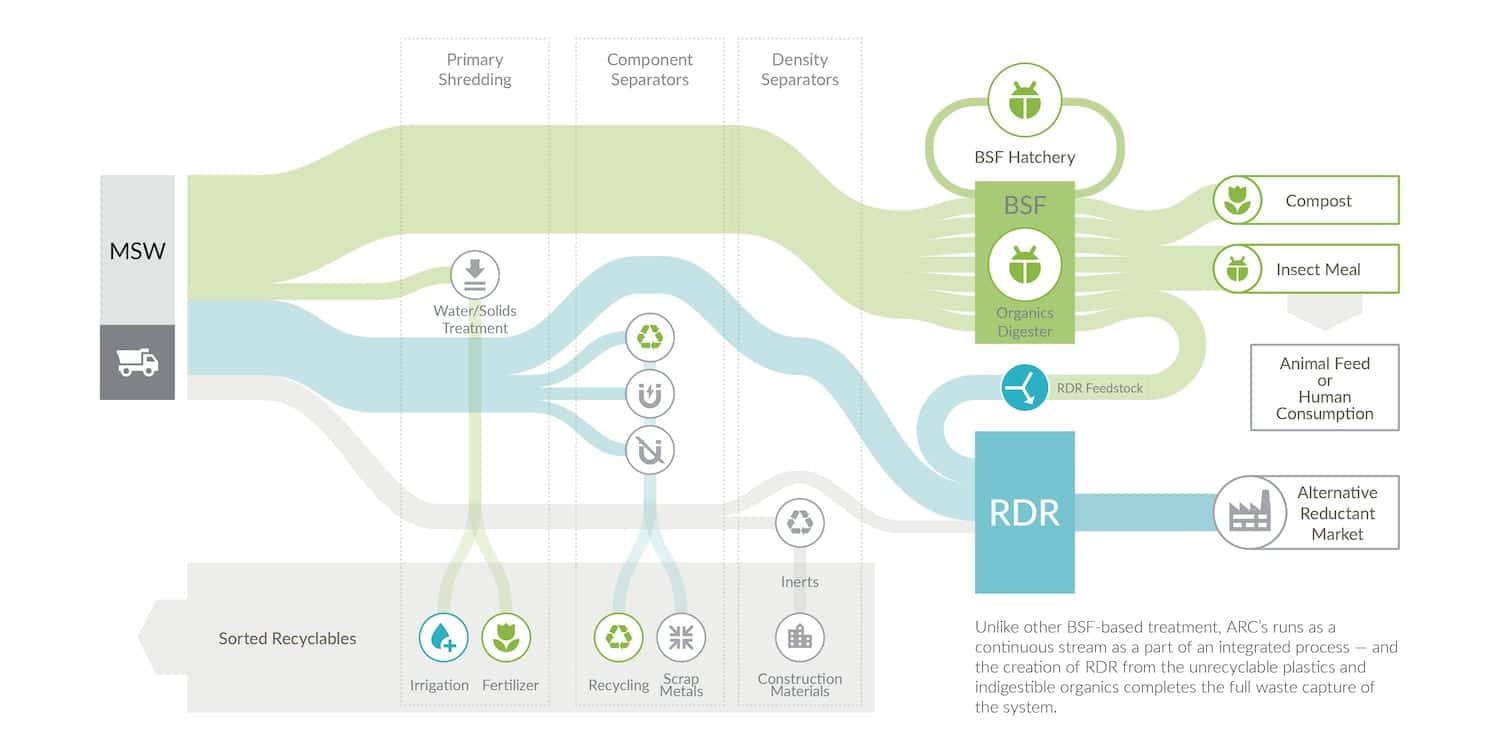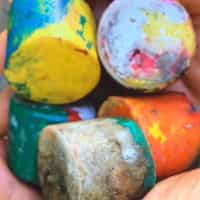
The ARC Process is a continuous series of mechanical and bio-mechanical processes that convert more than 70% of MSW into five marketable commodities:
· high nutrient compost
· high grade meal for aquaculture
· ferrous metals
· non-ferrous metals
· an innovative industrial reductant which can replace coking coal
The ARC Process is patent-pending and incorporates two technologies which serve as the heart of the system:
· the first is the use of black soldier fly larvae to consume all digestible organics in the MSW, converting them to highly marketable insect meal and nutrient-rich compost
· the second is the conversion of non-digestible organics such as plastics and cardboard into a valuable industrial use product, Refuse Derived Reductant™ (RDR) .
The process is initiated by screening and shredding incoming MSW using magnetic separators remove ferrous metals from the waste stream, followed by eddy current separators to recover non-ferrous metals. These metal products are then sorted for their salvage quality, and high-quality salvage is sold and shipped to buyers.
Our unique, patent pending process produces five MSW-derived
products.
The never-ending supply of MSW produced by
modern society assures a steady supply of our products while
insulating our production costs from virgin material price
fluctuations. Reliable supply, coupled with our rigorous quality
control program for ARCsoil, ARCmeal and RDR, assures the
quality and consistency of our products.
Innovative Technology
BSF Digester
The next step involves our proprietary Black Soldier Fly (BSF)
Digester where BSF larvae convert the 30% of MSW that is food
and other highly digestible organic waste into high-quality
compost and aquaculture and animal feed.
Our BSF
digester utilizes the voracity of BSF larvae to consume a wide
variety of organics. They are ideal for the innovative,
continuous process of the ARC Digester and they enable the
decomposition rate to match the rate at which organic waste is
introduced into the digester, whereas organisms, such as
earthworms, cannot match the rates of BSF larvae.
Accelerated
decomposition due to the patent pending design of the ARC
Digester creates a critical advantage by enabling the system to
efficiently handle all organics. The bio-products produced are
harvested and segregated to produce commercial products - insect
meal and organic compost fertilizer. System efficiency is
supplemented by the fact that indigestible organics (such as
wood, rubber and leather) move on to RDR processing into
commercial products.
hermetia illucens
The Black Soldier Fly
Nature’s Efficient Waste Processor
To process organic waste ARC’s solution draws on the
special capabilities of the black soldier fly (BSF) to provide a
sustainable and commercially viable process.
The
Black Soldier Fly Hermetia illucens is a true fly of the family
Stratiomyidae. Though originally native to the Americas, it now
occurs worldwide in tropical and temperate regions. Adults
consume nothing but water, do not approach humans, do not bite
or sting, and do not vector or disseminate any specific
diseases. BSF larvae feed on an immense variety of organic
material and have been described as “not picky eaters”.
They
are already used in small-scale waste management to process
manure, rice straw, food waste, distillers’ grains, fecal
sludge, animal offal, and kitchen waste and other organics. BSF
larvae may be the most efficient waste processors among the
flies and their feed conversion ratios are known to be superior
to both crickets and mealworms. BSF larvae are also edible and
are used as animal feed and can be consumed by humans (tastes
permitting). They accumulate sufficient lipids to provide energy
for the non-feeding adult to the point where they can be
converted into biodiesel. What they do not consume, combined
with their nitrogen-rich frass, can be used as fertilizer.
Their
three week larval stage is longer than that of house and carrion
flies (at less than 5 days) which means a single BSF larva will
consume a larger amount of substrate and produce larger pupae.
When BSF larvae are at the pre-pupa stage, they instinctively
leave the substrate and move to a high, clean place - a behavior
called “self-harvesting” - which removes an otherwise
labor-intensive step from their farming.
All these
benefits make the larvae of the Black Soldier Fly a highly
practical organism to process organic wastes and serve as a
sustainable animal, and possibly human, food source.
Innovative Technology

Refuse Derived Reductant™
Unique to the ARC Process™ is our patent-pending technology for
isolating and processing plastics and other non-digestible
organics into Refuse-Derived Reductant. Our RDR product is a
dense solid that has a high carbon content, few impurities and
an energy density approaching that of anthracite coal. As such,
it is a low-cost alternative to the use of high-grade coal or
coke in industrial applications such as smelting or the
manufacture of steel or other processes that require the use of
a highly efficient fuel or reducing agent.
Our RDR
process first passes plastics and other non-digestible organics
through a drying and semi-pyrolysing process to remove excess
moisture and start charcolising the organics. The process is
temperature controlled to maintain product quality and
consistency and the softened plastic is then put through a
plastic extruder to be formed into RDR briquets and dried. The
high density of the briquets facilitates handling and shipment
and makes them applicable to a wider range of industrial
applications.
Our innovative, efficient process
holds the promise to reduce MSW waste going to landfill by more
than 70% and ultimately close to zero, and possibly zero.
ARC’s
comprehensive approach is the strength of our system and we are
unaware of any other similar commercial process in the MSW
field.
